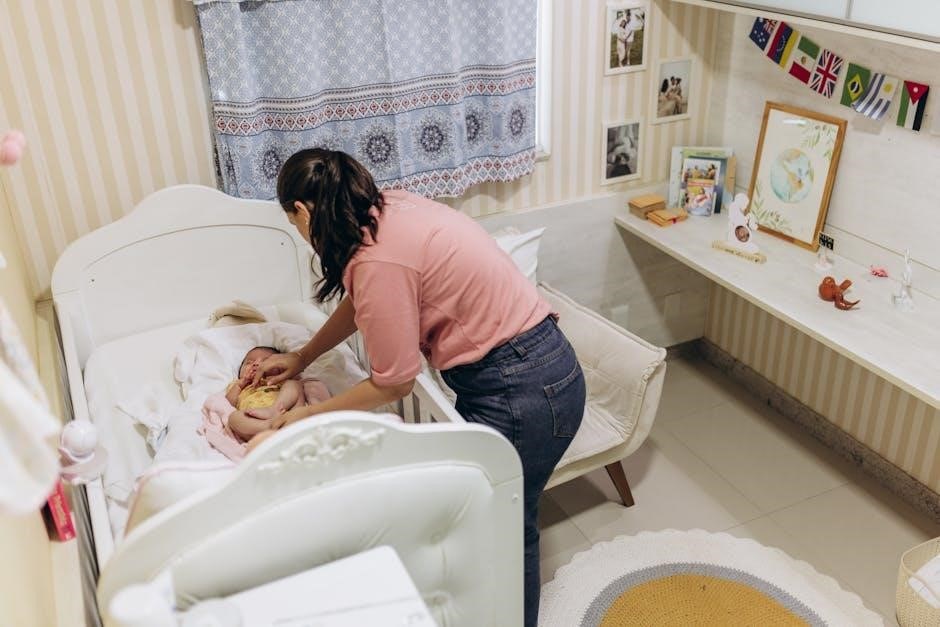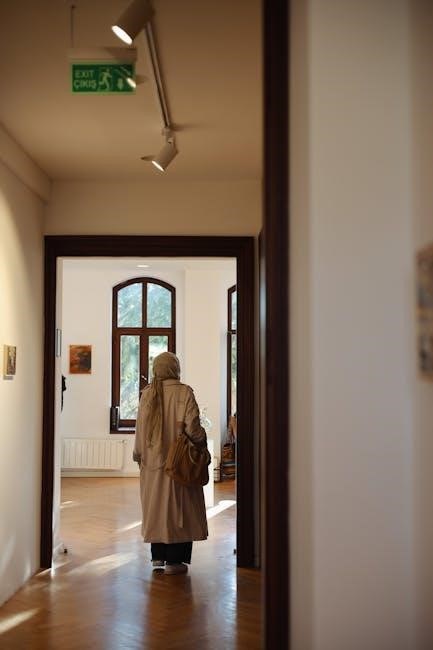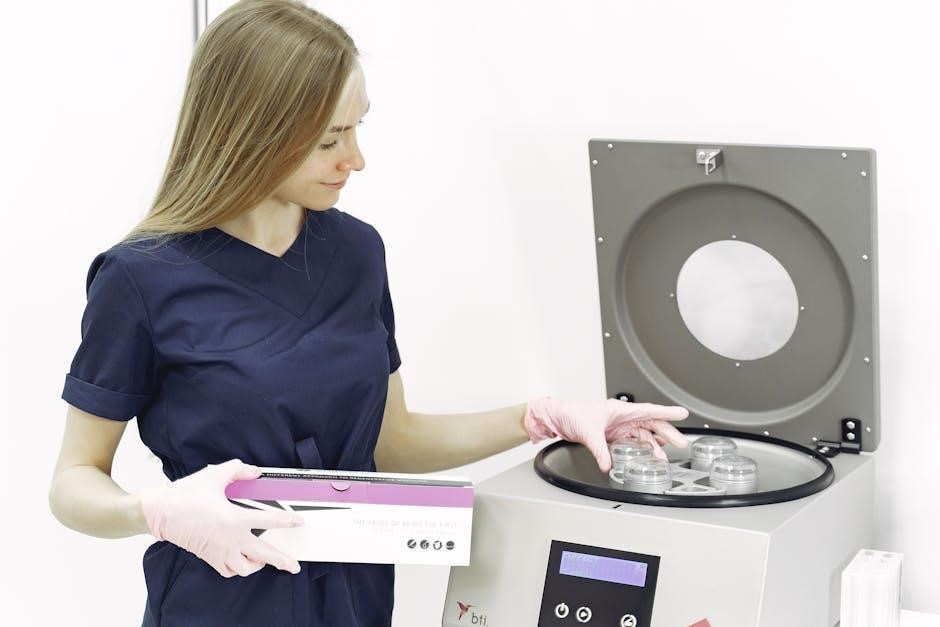Nursing escape room scenarios are interactive‚ collaborative activities where students solve puzzles and challenges to apply theoretical knowledge in practical‚ immersive situations. These scenarios enhance critical thinking‚ problem-solving‚ and teamwork‚ preparing future nurses for real-world clinical challenges. They often involve mock patient care scenarios‚ fostering engagement and improving knowledge retention through hands-on learning experiences.
What Are Nursing Escape Rooms?
Nursing escape rooms are interactive learning tools designed to simulate real-world clinical scenarios‚ fostering critical thinking and teamwork among students. These immersive environments present challenges that require participants to solve puzzles‚ find clues‚ and apply nursing principles to “escape” within a set time. They often mimic hospital settings‚ incorporating mock patient cases and medical equipment‚ ensuring learners engage actively with course content. Escape rooms encourage collaboration‚ as students work together to complete tasks‚ reflecting the teamwork essential in healthcare. By integrating hands-on problem-solving‚ these activities bridge the gap between theoretical knowledge and practical application‚ preparing future nurses for dynamic clinical environments. This innovative approach enhances engagement‚ retention‚ and the ability to think critically under pressure‚ making them a valuable educational resource in nursing training.
The Purpose of Nursing Escape Rooms in Education
Nursing escape rooms serve as dynamic educational tools designed to enhance active learning by immersing students in realistic clinical simulations. Their primary purpose is to bridge the gap between theoretical knowledge and practical application‚ allowing students to apply nursing principles in high-pressure‚ time-sensitive scenarios. These activities are crafted to foster critical thinking‚ teamwork‚ and effective communication‚ mirroring the collaborative nature of healthcare environments. By engaging students in problem-solving challenges‚ escape rooms help build confidence and competence in managing patient care situations. They also provide a safe space for learners to make mistakes and learn from them‚ ultimately preparing them for the complexities of real-world nursing practice. This innovative approach to education ensures that students are better equipped to handle the demands of their future careers in healthcare.
Relevance of Escape Rooms in Nursing Training
Escape rooms are highly relevant in nursing training as they offer a unique‚ immersive learning environment that simulates real-life clinical scenarios. These interactive activities allow nursing students to practice critical thinking‚ decision-making‚ and problem-solving skills in a time-sensitive‚ collaborative setting. By integrating nursing care principles into puzzles and challenges‚ escape rooms help students apply theoretical knowledge to practical situations‚ enhancing their ability to respond to patient needs effectively. Additionally‚ escape rooms foster teamwork and communication‚ essential skills for nurses working in dynamic healthcare teams. The hands-on nature of escape rooms also promotes engagement and retention of complex concepts‚ making them a valuable tool in modern nursing education. They provide a safe space for learners to experience the pressures of clinical practice without real-world consequences‚ preparing them for the challenges of their profession.

Design and Development of Nursing Escape Rooms
Designing nursing escape rooms involves creating immersive scenarios‚ integrating puzzles with learning objectives‚ and ensuring alignment with clinical training. Testing and refinement are crucial for effectiveness.

Key Areas of Focus in Escape Room Design
Escape room design for nursing education focuses on creating immersive‚ relevant scenarios that align with learning objectives. Key areas include topic selection‚ setting‚ and puzzle integration. Time limits‚ ranging from 20 to 120 minutes‚ are set to simulate real-world pressures. Faculty testers refine the experience‚ ensuring clarity and challenge. Clear instructions and debriefing sessions are essential for reflection and knowledge retention. Feedback mechanisms help identify areas for improvement‚ ensuring future scenarios address gaps in understanding. The design process emphasizes collaboration‚ critical thinking‚ and practical application of nursing principles‚ making it an effective tool for clinical training.
Creating Engaging Scenarios for Nursing Students
Engaging escape room scenarios for nursing students involve realistic clinical challenges that mirror real-life patient care situations. Scenarios are crafted to promote active learning‚ requiring students to apply theoretical knowledge to solve puzzles and progress. Collaborative problem-solving is encouraged‚ fostering teamwork and communication skills. Scenarios often include mock patient interactions‚ medical emergencies‚ and critical care dilemmas‚ ensuring relevance to nursing practice. Providing clear objectives and feedback mechanisms enhances the learning experience‚ while incorporating technologies like virtual reality (VR) can further boost engagement. These scenarios are designed to challenge students’ critical thinking and adaptability‚ preparing them for diverse clinical settings and unexpected patient outcomes.
Integrating Nursing Care Principles into Puzzles
Integrating nursing care principles into escape room puzzles enhances learning by embedding clinical concepts within interactive challenges. Students encounter puzzles that require applying fundamental care principles‚ such as patient assessment‚ medication administration‚ and wound care. For example‚ decoding a “prescription” puzzle might involve calculating drug dosages‚ reinforcing pharmacological knowledge. These puzzles are designed to align with curriculum objectives‚ ensuring students practice critical thinking and clinical reasoning. Feedback mechanisms‚ like unlockable clues‚ provide immediate assessment of understanding. This method not only reinforces theoretical knowledge but also builds practical skills‚ preparing students for real-world patient care scenarios in a dynamic and engaging manner.

Debriefing and Reflection in Escape Room Activities

Debriefing and reflection are essential components of escape room activities in nursing education. After completing the escape room‚ students participate in facilitated discussions to review their problem-solving strategies‚ communication‚ and teamwork. Faculty guide these reflections to highlight key learning points‚ such as clinical decision-making and prioritization of care. Students also identify areas for improvement‚ reinforcing the connection between the simulated scenario and real-world nursing practice. This reflective process enhances knowledge retention and helps students articulate their thought processes‚ fostering professional growth and preparedness for future clinical challenges.

Benefits of Nursing Escape Room Scenarios
Nursing escape rooms enhance critical thinking‚ problem-solving‚ and teamwork while boosting knowledge retention and engagement. They prepare students for real-world challenges through immersive‚ collaborative learning experiences.
Enhancing Active Learning in Nursing Education
Nursing escape rooms foster active learning by immersing students in real-world scenarios‚ requiring hands-on problem-solving and collaboration. These interactive environments encourage students to apply theoretical knowledge practically‚ enhancing their ability to retain and recall critical information. Unlike traditional lectures‚ escape rooms engage students dynamically‚ making learning more enjoyable and effective. The immersive nature of these activities forces students to think critically and make decisions under time constraints‚ mirroring the fast-paced nature of healthcare settings. This approach not only improves understanding but also builds confidence and readiness for clinical practice. By actively participating in escape room challenges‚ nursing students develop a deeper connection to the material‚ leading to better preparation for patient care scenarios.
Improving Critical Thinking and Problem-Solving Skills
Nursing escape rooms are designed to sharpen critical thinking and problem-solving abilities through complex‚ scenario-based challenges. Students must analyze clues‚ prioritize actions‚ and make swift decisions‚ simulating the high-stakes environment of healthcare. These activities encourage logical reasoning and creativity‚ as participants often face unexpected obstacles requiring innovative solutions. The time-sensitive nature of escape rooms further intensifies the need for effective decision-making‚ mirroring real-life emergencies. By engaging in these exercises‚ nursing students develop the ability to approach problems systematically‚ enhancing their competence in patient care. The immersive experience fosters a mindset geared toward quick yet thoughtful action‚ ultimately preparing future nurses to handle diverse clinical challenges with confidence and precision.
Fostering Collaboration and Teamwork Among Students
Nursing escape rooms excel at fostering collaboration and teamwork‚ as students work together to solve puzzles and achieve common goals. Each participant brings unique perspectives and skills‚ replicating the multidisciplinary nature of healthcare teams. Open communication‚ active listening‚ and role delegation are essential for success‚ encouraging students to rely on each other’s strengths. The collaborative environment builds trust and camaraderie among team members‚ preparing them to function effectively in real clinical settings. By sharing insights and coordinating efforts‚ students learn to value teamwork‚ a crucial component of providing cohesive patient care. These activities not only enhance interpersonal skills but also mirror the collaborative dynamics of professional nursing environments‚ ensuring students are well-prepared for future challenges.

Types of Nursing Escape Room Scenarios
Nursing escape rooms include simulation-based‚ virtual interactive puzzle escape rooms (VIPER)‚ and hybrid models combining physical and digital elements. Each type offers unique learning experiences tailored to specific clinical scenarios and skill development.
Simulation-Based Escape Rooms for Clinical Training
Simulation-based escape rooms replicate real clinical environments‚ offering nursing students hands-on experience in high-pressure scenarios. These rooms are equipped with medical tools and lifelike patient simulations‚ enabling students to practice emergency response‚ patient assessment‚ and decision-making. Timed challenges‚ such as “mock code” simulations‚ require teams to solve problems collaboratively‚ mirroring real-life clinical situations. Faculty can design scenarios to address specific learning objectives‚ such as prioritizing patient care or managing resources effectively. These immersive activities improve critical thinking and teamwork‚ preparing students for the demands of healthcare professions. Post-activity debriefings allow for reflection and analysis of decisions made during the simulation‚ enhancing overall learning outcomes.
Virtual Interactive Puzzle Escape Rooms (VIPER)
Virtual Interactive Puzzle Escape Rooms (VIPER) offer an innovative digital platform for nursing education‚ combining interactive puzzles with clinical scenarios. These virtual rooms simulate real-life patient care challenges‚ requiring students to solve complex problems and apply nursing principles. VIPER scenarios often focus on high-stakes situations‚ such as prioritizing patient assessments or managing medical emergencies. The virtual format allows for scalability‚ enabling large groups to participate simultaneously‚ regardless of location. Students engage in collaborative problem-solving‚ fostering teamwork and critical thinking. The immersive nature of VIPER enhances knowledge retention and prepares students for dynamic clinical environments. Additionally‚ virtual escape rooms provide flexibility‚ as scenarios can be adapted to address specific learning objectives or emerging trends in nursing practice‚ ensuring a modern and relevant educational experience.
Hybrid Escape Rooms Combining Physical and Digital Elements
Hybrid escape rooms blend physical and digital elements to create immersive learning experiences for nursing students. These scenarios integrate hands-on activities with virtual puzzles‚ allowing students to interact with both tangible objects and digital interfaces. For example‚ students might analyze digital patient records while conducting physical assessments on mannequins. This combination enhances engagement and simulates real-world clinical environments‚ where nurses must navigate both physical and technological tools. Hybrid rooms also offer flexibility‚ as educators can adapt scenarios to focus on specific skills‚ such as medication administration or emergency response. By merging physical and digital elements‚ these escape rooms provide a comprehensive learning experience‚ fostering critical thinking‚ collaboration‚ and the ability to handle complex clinical challenges in a dynamic‚ interactive setting.
Implementation of Nursing Escape Rooms
Nursing escape rooms are implemented through careful planning‚ combining interactive scenarios with educational objectives. They involve collaborative problem-solving‚ fostering critical thinking and teamwork among students in a timed environment.
Steps to Develop an Effective Escape Room Learning Activity
Creating a successful escape room learning activity involves several key steps. First‚ define the learning objectives aligned with the nursing curriculum; Next‚ design a scenario that incorporates relevant clinical challenges. Develop puzzles and clues that require application of nursing knowledge‚ ensuring they are logical and progressively complex. Test the escape room with faculty or students to identify and refine any issues. Finally‚ conduct a debriefing session post-activity to discuss successes‚ areas for improvement‚ and reinforce learned concepts. This structured approach ensures an engaging and educational experience for nursing students‚ enhancing their critical thinking and problem-solving skills in a simulated environment.

Timing and Duration of Escape Room Sessions
Escape room sessions for nursing education typically range from 20 to 120 minutes‚ depending on the complexity of the scenario and the number of participants. Timing is crucial to ensure students can engage meaningfully without feeling rushed. Faculty should test the escape room beforehand to determine an appropriate duration that aligns with learning objectives. A 45-minute session is often ideal‚ allowing sufficient time for problem-solving and collaboration. Post-activity debriefing should be included to reflect on the experience and reinforce key concepts. Timing adjustments may be needed based on student feedback and performance‚ ensuring the activity remains engaging and effective for nursing skill development.
Assessment and Evaluation in Nursing Escape Rooms
Assessment in nursing escape rooms involves measuring knowledge retention through pre- and post-tests‚ evaluating team performance‚ and identifying areas for improvement. Simulation escape rooms have shown improved post-test scores and enhanced mock code task accuracy‚ demonstrating their effectiveness in reinforcing learning. Feedback from participants is crucial for refining scenarios and ensuring educational goals are met. Regular evaluation helps optimize escape room designs‚ making them more impactful for nursing education and skill development.

Measuring Knowledge Retention Through Pre- and Post-Tests
Pre- and post-tests are essential tools for assessing knowledge retention in nursing escape room scenarios. These evaluations measure students’ understanding before and after participating in the activity‚ providing insights into their learning progress. Studies have shown that participants who engage in escape rooms often demonstrate significant improvements in post-test scores compared to pre-test results. For instance‚ in a mock code simulation escape room‚ students accurately completed an average of six more tasks after the experience. These assessments help identify gaps in knowledge and refine teaching strategies. By analyzing test results‚ educators can adjust escape room scenarios to better address challenging topics‚ ensuring a more effective learning experience. This method not only enhances retention but also prepares students for real-world clinical challenges.
Evaluating Team Performance and Problem-Solving Skills
Evaluating team performance and problem-solving skills in nursing escape rooms involves observing how students collaborate‚ communicate‚ and apply critical thinking. Educators assess participants’ ability to work cohesively‚ delegate tasks‚ and make decisions under pressure. Observational studies reveal that teams that demonstrate strong communication and leadership tend to perform better. Problem-solving skills are measured by how effectively students analyze clues‚ prioritize actions‚ and adapt to challenges. These evaluations help identify areas for improvement and refine future scenarios. By focusing on teamwork and problem-solving‚ escape rooms provide valuable insights into students’ readiness for real-world clinical environments‚ where collaboration and quick decision-making are essential. This approach ensures that nursing education remains dynamic and effective in preparing future professionals.

Future Directions and Innovations
Future nursing escape rooms may incorporate advanced VR and AR technologies for immersive training. Expanding scenarios to specialized fields like critical care and gerontology will enhance realism and relevance.
Advancements in Virtual Reality (VR) for Nursing Escape Rooms
Virtual reality is revolutionizing nursing escape rooms by creating highly immersive and realistic training environments. VR enables students to engage in lifelike clinical scenarios‚ such as emergency codes or patient assessments‚ from anywhere. Advanced VR systems allow for the simulation of complex patient interactions‚ enhancing critical thinking and decision-making skills. Multi-player VR also fosters teamwork‚ as students can collaborate in virtual spaces to solve challenges. The portability of VR technology makes it accessible for remote learning‚ expanding its reach. These advancements not only enhance the educational experience but also prepare nurses for high-pressure situations with improved confidence and competence. VR is paving the way for more dynamic and effective nursing education.
Expanding Escape Room Scenarios to Specialized Nursing Fields
Expanding escape room scenarios to specialized nursing fields enhances the diversity and depth of training opportunities. By tailoring scenarios to areas like pediatrics‚ gerontology‚ or critical care‚ educators can address field-specific challenges and competencies. For instance‚ an oncology-focused escape room might simulate medication administration complexities‚ while a mental health scenario could emphasize patient assessment and communication skills. Customizing scenarios to align with specialized nursing fields ensures that students gain practical experience relevant to their career paths. This approach also allows educators to address gaps in curriculum coverage and prepare students for the unique demands of niche nursing specialties. Expanding these scenarios fosters a more comprehensive and adaptable nursing education‚ better equipping graduates for real-world clinical environments.
Using Escape Rooms for Continuing Education in Nursing
Escape rooms offer a dynamic tool for continuing education in nursing‚ enabling professionals to refresh skills and adapt to evolving practices. These scenarios can simulate real-world clinical challenges‚ such as emergency response or patient safety protocols‚ allowing nurses to apply knowledge in immersive‚ low-risk environments. Virtual and in-person escape rooms provide flexibility‚ catering to diverse learning preferences. By incorporating case studies and emerging trends‚ escape rooms help nurses stay updated on evidence-based practices. They also foster collaboration‚ reinforcing teamwork and communication essential in healthcare settings. This innovative approach to professional development ensures nurses remain proficient and confident in addressing complex patient care scenarios‚ ultimately enhancing patient outcomes and workplace efficiency. Escape rooms thus serve as a valuable resource for lifelong learning in the nursing profession.
